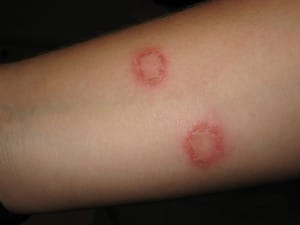Can Humans Get Ringworm?
Despite the name, ringworm is not a condition that is caused by worms, but rather, a common fungal infection. If you suspect that you might have ringworm, you can get medication from a pharmacy to treat it. A rash is the main symptom of ringworm. While this might be something that you most commonly associate with dogs or cats, humans can also get ringworm. The rash may look darker, redder, or more silver compared to your surrounding skin depending on your skin tone. A ringworm rash can also be dry, scaly, itchy, or swollen. It can appear anywhere on the body. The rash is usually in a ring shape; however, it can look different if it appears on the neck, scalp or face. In some cases, there is more than one rash, or the rash can grow or spread. When the face or scalp is affected, it can lead to patchy hair loss.
How Ringworm is Contracted
Ringworm is caused by a type of fungi. You can catch it from close contact with somebody else who is infected by ringworm, whether that is a human or an animal. If your pet has ringworm, it’s important to get them treatment from the vet as soon as possible and keep an eye on your own health, as you can catch it from your cat or dog. You can also catch ringworm from contact with infected objects like towels, bedsheets, or pet beds and blankets. To prevent catching ringworm from your infected pet, you can wash their bed and blankets on a hot wash. Ringworm can also be contracted from close contact with infected soil, although this is quite rare. Find out more about ringworm, how it is contracted, the main symptoms, and treatments at Patient.info. Patient.info provides further information on the different types of medication that you may be recommended or prescribed for this condition.
How to Prevent the Spread of Ringworm
If somebody in your household, including a pet, has symptoms of ringworm, there are a few things that you can do to prevent it from spreading. If you suspect that your pet has ringworm, which usually shows up in animals as patches of missing fur, then take them to the vet as soon as possible. Check your skin regularly if you have been in contact with a person or animal that is infected with ringworm. Wash towels and bedsheets regularly, and keep your skin clean, including washing your hands after you touch animals or soil. If you have symptoms of ringworm, then start treatment as soon as possible. You should avoid sharing towels, bedsheets, or hairbrushes and combs with somebody who has ringworm. Although this rash can be quite itchy, it’s important to avoid scratching a ringworm rash since this could spread the rash to other parts of your body.
When to See Your Doctor
Most of the time, you can get help with ringworm from your pharmacist, who can look at the rash and recommend an antifungal medication to help. Creams and sprays are available depending on where you are affected by the rash. Most of the time, you will need to use an antifungal medication daily for up to four weeks. It is important to continue using the medication for the recommended amount of time even if the rash clears up beforehand. You should see your doctor if the ringworm does not improve after using the antifungal medication recommended by your pharmacist. An appointment with your doctor will also be necessary if the ringworm has affected your scalp as you will need to use prescription antifungal shampoo and tablets for treatment. Anybody with a weakened immune system from steroids, chemotherapy, diabetes, or autoimmune conditions should also see their doctor if they suspect that they have ringworm.
Who Can Get Ringworm?
Ringworm is a very common condition that anybody can get. However, people who have a weakened immune system are often at a higher risk of getting a ringworm infection and may have a harder time fighting the infection off. People who use locker rooms or public showers, especially those who are involved in contact sports, people who sweat excessively, people who wear tight shoes, and people who have close contact with animals are at a higher risk of coming into contact with the fungus that causes ringworm.
How to Avoid Ringworm
There are several things that you can do to prevent ringworm and reduce your risk, including keeping your skin clean and dry, and wearing shoes that allow air to freely circulate around your feet. Avoid walking barefoot in places like public showers, pools, or locker rooms. Change your underwear and socks at least once per day, and keep your fingernails and toenails clean and short. If you play contact sports, then you may be at a higher risk of ringworm than most. To avoid the infection, keep all your sports gear clean and shower immediately after practice sessions or matches. Avoid sharing any sports gear with other players.
What to Do If Your Pet Has Ringworm
Ringworm can be easily transferred to humans from animals. If your pet has ringworm, there are several things that you can do to protect yourself. Always wash your hands with soap and running water after petting or playing with your pet. If you need to handle an animal with ringworm, wear long sleeves and gloves in order to prevent skin contact and wash your hands afterwards. Disinfect any areas that your pet has spent time in, such as bedding and surfaces, and vacuum all areas of the home that your pet goes to, as this will remove any infected flakes of skin or fur. You can use strong detergents, diluted chlorine bleach, or benzalkonium chloride to disinfect areas where your pet has been.
Can You Use Home Remedies for Ringworm?
There are some home remedies that people have been using for a long time before antifungal treatments were invented. While you are always better off getting an antifungal treatment for ringworm from your doctor or pharmacist, you can use certain home remedies to relieve the symptoms. Some common remedies include apple cider vinegar, turmeric, or coconut oil. Some people soak cotton balls in apple cider vinegar or coconut oil and apply it to the affected area three times a day to relieve ringworm. You can also mix turmeric with water to create an antifungal paste that is directly applied to your skin before allowing it to dry. Some essential oils such as lemongrass oil, oregano oil, and tea tree oil can be used as home remedies to treat ringworm. However, since home remedies are based on anecdotal evidence rather than scientific evidence for treating ringworm, it is not advised to use them in place of antifungal treatments. It is a good idea to discuss any home remedies that you are considering using with your doctor or pharmacist beforehand.
Ringworm is a fungal condition that you may usually associate with cats and dogs. However, it can also affect humans, and is very contagious. You can catch it from an infected person or animal, either through direct contact or by sharing contaminated items. Ringworm is usually treated with an antifungal medication that you will normally be able to get from a pharmacy.



